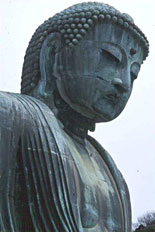 Dependent upon whom one asks, Zen is either a school of Buddhism or a school of thought and ethical philosophy adjunct to Buddhism. While zen often teaches the folly of differentiation, hard definition and non-malleable mental categorization, it also teaches that all things should be understood by their very nature. Thus, one often finds discussions of little-z zen as a philosophical critter unto itself, Buddhism as another critter unto itself and Capital-Z Zen (aka: Zen Buddhism) as the distinct and separate child of the two.
Dependent upon whom one asks, Zen is either a school of Buddhism or a school of thought and ethical philosophy adjunct to Buddhism. While zen often teaches the folly of differentiation, hard definition and non-malleable mental categorization, it also teaches that all things should be understood by their very nature. Thus, one often finds discussions of little-z zen as a philosophical critter unto itself, Buddhism as another critter unto itself and Capital-Z Zen (aka: Zen Buddhism) as the distinct and separate child of the two.
Whatever the case, an assumption shared by all of the Schools of Ch'an and Zen is that Capital-Z Zen can only be applied with a solid foundational understanding of Buddhism.
The baseline essential teachings of Buddhism are contained in the Precepts thereof, the Four Noble Truths and the Noble Eightfold Path
Unlike the 10 Commandments to which the West may be best accustomed, the Layman's Precepts in most schools are phrased as suggestions. The assumption being not that the adherent must be told what to do, but that if the adherent wishes to attain the fruits of the practice, the following should be done:
- Refrain from taking the life of sentient beings;
- Refrain from taking what is not given;
- Refrain from harmful conduct in sexual pleasures;
- Refrain from false speech;
- Refrain from the use of intoxicants.
While these five precepts are generally accepted as the bottom line for a lay practitioner, Zen and other schools of Buddhism have added suggested abstentions and behaviors for more advanced practitioners and ordained clergy. A quick link to this booklet of Soto Precepts as utilized by the Dogen Sangha and the Hideo Ida Zazen Dojo of Japan will give one a further idea of some of the additional precepts and the procedures (I hate the word "ritual") used by that school.
Another of the essential tenets of Buddhism is The Four Noble Truths. These are the truth of suffering and the way out of suffering as determined by the Buddha and are fundamental to all schools of Buddhism. In truth, the use of the term "suffering" may be too strong. The Buddha never taught that all of life is agony. The proper term "dhukka" that has been commonly translated as the srong word "suffering" has a connotative value in the original that would convey everything from a "basic pain in the butt" to abject misery.
The Four Noble Truths are: 1) Suffering is inevitable in life 2) Suffering is caused by desires, attachments or craving 3) Suffering can be stopped 4) There is a Way that, if practiced, will put the stop to suffering. That Way is embodied in The Noble Eightfold Path.
The Noble Eightfold Path is the elucidation of the minimal views and concepts needed to live a Way that alleviates suffering. It forms the basis for the ethical teachings of Buddhism (and, by extension, Zen as well).
The short version version of the Noble Eightfold Path as set forth in teachings from the Digha and Anguttara Nikaaya sutras of Buddhism are to develop:
- Right View (Right Understanding) "To understand suffering; to understand the origin of suffering; to understand the extinction of suffering; and to understand the path that leads to the extinction of suffering. This is called Right Understanding."
- Right Thought "Thought free from lust; thought free from ill-will and "thought free from cruelty. This is called Right Thought."
- Right Speech "Abstaining from lying; abstaining from telling tales (slander); abstaining from "harsh language" (generally construed to deal with unpleasant presentation rather than "course" words); and abstaining from vain talk are the basics here.
- Right Conduct (Right Action) Which is living in accord with the Precepts as above
- Right Livelihood “When the noble disciple, avoiding a wrong way of living, gets his livelihood by a right way of living, this is called Right Livelihood. In the Majjhima-Nikaaya, No. 117, it is said: `To practice deceit, treachery, soothsaying, trickery, usury: this is wrong livelihood.' And in the Anguttara-Nikaaya, V. 1 77, it is said: `Five trades should be avoided by a disciple: trading in arms, in living beings, in flesh, in intoxicating drinks, and in poison'. Included are the professions of warrior, fisherman, hunter, etc.
- Right Effort is avoiding evil or unwholesome things; overcoming evil or unwholesome things; developing positive or wholesome attitudes and actions, and maintaining positive or wholesome attitudes and actions
- Right Mindfullness includes tending the proper needs of the Body; being thoughtful of the emotional needs of self and others; contemplation of the Mind (keeping a clean and fair mind); and Contemplation of the Mind-Objects (which can get complicated -- basically it means recognizing fantasy from reality and not constructing concepts and headgames to justify treating others badly) and
- Right Meditation (Right Concentration) in essence, the kind of mental concentration which is present in every wholesome state of consciousness and is accompanied by at least Right Thought , Right Effort and Right Mindfulness. `Wrong Concentration' is present in unwholesome states of consciousness, and as such is only possible in the sensuous, not in a higher sphere of being.
And that's it "in a nutshell!"
